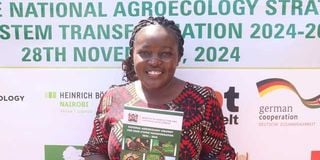Agroecology activists push for increased funding to strengthen sustainable farming

Rosinah Mbenya at a past event.
Agriculture-led civil society groups are pushing for increased funding towards sustainable farming to strengthen food systems in Kenya and across the African continent.
The activists lament that sustainable farming practices such as agroecology have for a long time remained underfunded—an oversight that continues to impede efforts to address food insecurity and hunger.
Speaking on Thursday, July 10, at the ongoing second edition of the National Agroecology Symposium in Nairobi, Rosinah Mbenya, the Participatory Ecological Land Use Management (Pelum) Kenya Country Coordinator, regretted that the sector remains underfunded despite its crucial role in improving food production.
“If we want to address food insecurity and hunger, we need to increase financing for sustainable agriculture practices such as agroecology,” urged Ms Mbenya.
In Kenya’s national budget, for instance, the agriculture sector typically receives about 3 percent of the total budget allocation, while the global average is estimated to be around 5 percent, of which only 1.5 percent goes to sustainable agricultural practices.
Sector-based civil society groups and activists are now calling for over 50 percent of attention and focus to be directed to agriculture.
Ms Mbenya noted that with such an allocation, agroecology would get a fair share of the funding.
“Globally, there is a climate crisis, and agriculture contributes about 25 percent of greenhouse gas emissions. To reverse such impacts, sustainable farming methods should be embraced, especially by farmers. Agriculture is Kenya’s mainstay, and we want agroecology to be at the center of economic development. That is why it needs adequate funding,” she explained, calling on the government and other actors to fund the sector while acknowledging its immense contribution to employment, especially in rural areas.
Even in urban settings, agriculture is thriving, with residents adopting climate-smart agriculture technologies, alongside mama mbogas who supply most households with vegetables, fruits, and other food products.
The government acknowledges the existing financing gap in the agroecology sector.
“Everything in Kenya is underfunded—not because we don’t prioritize sustainable farming practices such as agroecology, but because resources are dwindling. However, we should appreciate the government’s effort to ensure every sector is not left behind,” said Engineer Laban Kiplagat, the Agriculture Engineering Secretary at the State Department for Agriculture, Ministry of Agriculture and Livestock Development.
In an interview on the sidelines of the two-day National Agroecology Workshop, Mr Kiplagat, who also chairs the Inter-Sectoral Forum on Agroecology and Agro-Biodiversity, observed that even with limited public resources, the government is working with both local and international NGOs to bridge the funding gap.
He, however, did not reveal the number of non-governmental organizations the government is collaborating with to promote agroecological practices, nor the estimated annual budget required.
The Ministry of Agriculture, he said, continues to receive significant support from grassroots organizations.
“The Agriculture Ministry is getting a lot of support from grassroots organizations,” Mr Kiplagat told journalists.
The call for increased funding for sustainable agricultural practices comes just a few months after the Kenyan government, in collaboration with key stakeholders, launched the National Agroecology Strategy for Food System Transformation (NAS-FST), which aims to revamp the country's farming and food systems.
The 2024–2033 Strategy, unveiled at the end of last year, also seeks to address critical challenges facing agriculture in Kenya, particularly those related to soil health, climate change shocks, and the entire food production value chain.
“With the policy in place, it will inform policy and decision-making,” said Mr Kiplagat.
The Strategy recognizes agroecology as an approach to facilitate the transition toward more productive, sustainable, and inclusive food systems.
Agroecology is an integrated approach that applies ecological, biodiversity-protecting, and social principles to the design and management of food and agricultural systems.
According to Susan Chomba, the Food, Land and Water Director at the World Resources Institute, who also spoke during the workshop, bridging the financing gap in the agricultural sector requires data to inform decisions across the board.
Lack of data in agriculture, not only in Kenya but across Africa, continues to impede the growth of a sector that is central to GDP development.
The symposium, attended by over 400 civil society groups, activists, and stakeholders, was themed ‘Scaling Up Agroecology Initiatives for Soil Health, Climate Resilience, Economic Stability and Sustainable Healthy Food Systems’.
Most African countries have yet to comply with both the Malabo Declaration (2014) and the Kampala Declaration on CAADP (2025), where continental leaders committed to allocating at least 10 percent of their national budgets to agriculture.


